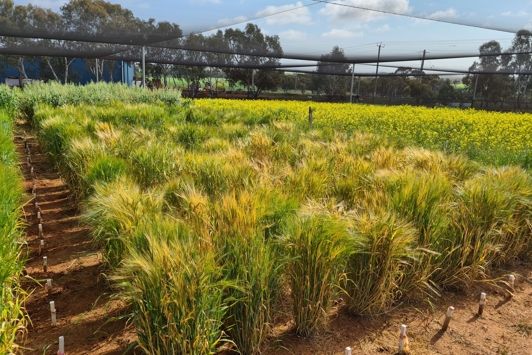With more than 150 highly qualified research and technical staff, our grains team leads innovation in the sector.
Dedicated research facilities are located at key sites across the state, including Geraldton, Wongan Hills, Northam, Merredin, Katanning, Esperance, and Albany, contribute to critical analysis of challenges and opportunities within the grains supply chain.
Collaboration is a cornerstone of our work, engaging with stakeholders to promote solutions through policy initiatives and co-investment with industry.
These efforts are supported by strong partnerships with research institutions and industry networks, ensuring research remains relevant and accessible to the Western Australian (WA) grains industry.
We maintain extensive formal and informal networks across the supply chain for WA’s key grain commodities. Engagement with industry is facilitated through formal roles, such as participation in GIWA Commodity Councils, and broader networks that inform market understanding.
Key alliances include partnerships with Murdoch University (Western Crop Genetics Alliance, SoilsWest), commercial ventures in cereal (InterGrain), and lupin breeding (AGT), and investments in the Australian Export Grains Innovation Centre (AEGIC), Grain Industry Association of Western Australia (GIWA), and Grower Group Alliance (GGA).
Our grains research spans a diverse range of disciplines, each contributing to the sustainable growth and profitability of WA’s grains industry. These core research areas include:
Grains industry development
Stewardship is provided across the grains supply chain to enable industry participants to maximise resilience, adaptability, and profitability.
Crop protection
Innovative tools and strategies are developed to minimise losses from pests, weeds, and diseases, equipping industry stakeholders with cutting-edge solutions. New technologies focus on early identification and management to reduce the reliance on chemical inputs.
Soil science and crop nutrition
Research in soil management aims to improve the efficiency of water and nutrient use in crops. The goal is to support sustainable and productive farming systems by enhancing the physical, chemical, and biological properties of soil.
Crop science and grain production
Key information and tools are provided to optimise the management of major crop types and varieties. This work ensures that growers can adapt to evolving seasonal conditions and farm business requirements while maximising yield and quality.
Genetic improvement
New breeding lines and genetic solutions are developed and evaluated under WA conditions. These solutions are passed on to breeding companies, contributing to the development of superior crop varieties for local conditions.
Field research operations
Timely and efficient technical services are delivered to manage research infrastructure and equipment. This ensures that research programs in the WA grainbelt are supported with the necessary tools to achieve their objectives.
Resilient soils for evolving farming systems
- Strategies are being developed to manage multiple soil constraints, improve soil longevity, and enhance crop nutrition in evolving grain production systems.
- The impact of changing farming practices and soil conditions is continuously assessed to improve soil quality and support the adoption of research outputs.
- Emerging global drivers, such as the carbon economy and GHG emissions, are addressed.
Integrated management of weeds, pests, and diseases
- New tools are being developed for the early identification and tactical management of weeds, pests, and diseases.
- On-farm strategies are designed to reduce chemical inputs while minimising yield losses.
- These technologies are integrated into farm management packages to benefit the WA grains industry.
Transforming the WA grains industry with a 50% reduction in inputs
- Low-input cropping systems are being implemented to manage weeds, pests, and diseases using new technologies.
- Biological nitrogen and diversification through grain and pasture legumes are explored as part of a low-input cropping approach.
- Grain yields are enhanced by improving water and nutrient use efficiency.
Partnerships in oats and lupins to support industry growth
- Opportunities are being explored to develop new products, differentiate offerings, and access premium markets.
- Industry-led partnerships, supported by government contributions, drive growth across the supply chain for oats and lupins.
Western Farming Systems initiative
- Regionally appropriate systems are identified and evaluated to optimise profitability while minimising economic and environmental risk.
- Strategies are developed to capture maximum benefit from seeding opportunities, especially from late March onwards.
- Research into GHG emissions from cropping systems provides industry with management options to reduce emissions.

